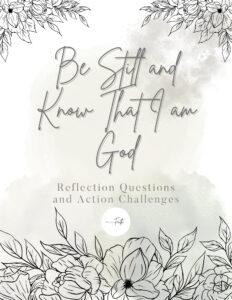Be Still and Know That I Am God Meaning, Context, and Spiritual Application
Please note that this article may contain affiliate links. As an Amazon Associate, I earn on qualifying purchases at no additional cost to you. You can read more at the bottom of this page or read my full disclosure on my Affiliate Disclosure Page
We live in a world that never seems to slow down. From the moment we wake up, we’re pulled in every direction. Our calendars are full, our minds race, and our souls feel worn thin. It’s hard to find peace when everything feels urgent. That’s why so many people are drawn to Psalm 46:10.
But the real be still and know that I am God meaning goes deeper than a peaceful saying. It’s an invitation to stop striving and start trusting. This one verse offers a kind of stillness that doesn’t depend on quiet circumstances, but on a steady God.
Be sure to download your free copy of our printable Be Still and Know Bible Study, Reflection and Action Challenge guide with worksheets at the end of this post! No sign up required!

What Psalm 46:10 Really Means
“He says, ‘Be still, and know that I am God; I will be exalted among the nations, I will be exalted on the earth.’”
Psalm 46:10
This verse sits inside a song written during chaos. Psalm 46 speaks of mountains trembling, waters roaring, and kingdoms tottering. In the middle of all this is the voice of God, inviting His people into peace, not because circumstances are calm, but because He reigns.
This isn’t a call to sit still on a couch. It’s a call to stop striving. To stop panicking. To recognize who is truly in control.
Be Still: A Hebrew Word Study
Stillness is more than quiet
Stillness is more than quiet. It’s not just sitting in silence or turning off your phone. It’s a spiritual posture; one of trust, surrender, and recognition that you are not the one holding the world together. Understanding the meaning of be still and know that I am God goes far beyond surface calm. It’s about releasing your grip on what you can’t control and remembering who truly reigns.
In the original Hebrew, the phrase translated as “Be still” is raphu, a form of the root word raphah (רָפָה). It means “to let go,” “to release,” “to sink,” or “to cease striving.” But here’s the key: it’s not a gentle suggestion. It’s a command. It’s God saying, “Stop.” “Cease.” “Let go.” It’s a divine order to lay down your weapons, to release your anxious grip on control, and to acknowledge Him as God.
This isn’t about inaction. It’s about surrender. It’s about recognizing that God doesn’t need our frantic efforts to be victorious. In fact, our constant striving can get in the way of seeing what He’s already doing. Psalm 46 is a battlefield Psalm, not a coffee mug quote.
The command to be still was spoken into a backdrop of war, chaos, and shaking foundations. God was saying to His people, and even to the nations, stop trying to fix it yourself. Stop your fighting. I’ve got this.
When you stop striving, you create space for God to move. Stillness says, “God, I trust You more than I trust my plans. I believe You are working, even when I can’t see it.” This is not passivity. It’s active surrender. It’s confidence that comes from knowing that the same God who speaks to the storm also speaks to your soul.
Let this verse reshape your days, not just the quiet mornings when the coffee is warm and the house is peaceful, but especially the messy ones. When your thoughts are racing and nothing feels stable, Psalm 46:10 invites you to breathe, release, and realign with the truth: God is enough, and He is near.
Historical and Theological Context of Psalm 46
Psalm 46 was attributed to the Sons of Korah, a group of Levites responsible for leading worship in the temple. This psalm wasn’t just a poetic musing; it was a worship anthem meant to anchor the people of God during fearful times.
Possible Historical Contexts:
Scholars and traditional interpreters have proposed several possible historical backdrops for this psalm.
- The Assyrian Threat (701 BCE):
Many suggest it reflects the miraculous deliverance of Jerusalem during King Hezekiah’s reign, when the Assyrian army under Sennacherib besieged the city (see 2 Kings 18–19; Isaiah 36–37). The angel of the Lord struck down 185,000 Assyrian soldiers overnight, and Jerusalem was saved without battle. The themes of stability in the face of upheaval and divine deliverance match this scenario well. - Liturgical Use in the Temple:
The psalm may have been used in worship, particularly during pilgrimages or festivals like Sukkot, which celebrates God’s provision and presence. The reference to the “river whose streams make glad the city of God” (v. 4) could allude to Jerusalem’s spiritual center, the Temple, and the symbolic flow of divine grace. - Apocalyptic or Eschatological Themes:
Some rabbinic and Christian interpretations see it as looking ahead to messianic times, when God will ultimately bring peace to the nations and dwell with His people.
A Call to Surrender, Not Just Silence
This verse doesn’t tell you to stop working or caring. It’s not an invitation to apathy. It’s a command to surrender control.
You might be tempted to take charge, fix everything, or prove yourself. God says, “Stop. Know Me.” He’s not asking you to disengage. He’s inviting you to trust that your striving isn’t what holds the world together.
This kind of stillness requires faith. It takes spiritual strength to be quiet when everything around you is loud. But it’s in that space that God makes Himself known.
3 Common Misinterpretations of Psalm 46:10
- Myth: It’s about physical stillness only
People often think this verse means quiet time with no noise. While solitude helps, this verse is deeper. It’s about heart surrender. - Myth: It’s meant for individual meditation only
Psalm 46 is a corporate psalm. The “you” is plural. This call is for the whole community to stop striving and remember God reigns. - Myth: It means don’t take action
God doesn’t call us to be passive. He calls us to act from a place of trust, not panic. Stillness is the posture of trust, not the absence of action.
How to Practice Stillness in Modern Life (Devotional Guide)
Stillness doesn’t always mean silence. In today’s fast-paced world, it’s more about posture than place. Here are a few ways to create room for God:
- Start your morning unplugged: Before you check your phone, read one verse and sit with it.
- Practice breath prayers: Inhale: “Be still.” Exhale: “And know You are God.”
- Use a journal: Write what you’re holding tightly. Ask God to help you release it.
- Set a timer for 3 minutes of quiet: Focus on one name of God and repeat it slowly.
These small steps open your heart to God’s voice in the noise.
Be Still and Know in Times of Anxiety and Overwhelm
When anxiety spikes or life feels like too much, Psalm 46:10 becomes a grounding truth. You don’t have to be in control. You are not the fixer. God is not asking you to carry the weight of the world.
You can repeat this verse when:
- You’re sitting in traffic, late again.
- You’re staring at a hospital ceiling, waiting for test results.
- You’re scrolling your phone, looking for something to settle your nerves.
This verse is an anchor for the anxious heart. It reminds you that even when life is messy, God is immovable.
How This Verse Points to Jesus
Psalm 46:10 whispers the name of Jesus before we even see Him in the New Testament. In Mark 4, Jesus stands in a boat during a storm and says, “Peace, be still.” And the winds obey.
In Him, the storm stops, not because circumstances got better, but because the One who reigns over them is near.
Jesus is the fulfillment of this verse. He’s the stillness in your chaos. The One who holds you when your world shakes.

Faith Lessons from Biblical Figures Who Were Called to Be Still
Moses at the Red Sea – Exodus 14:13
“Do not fear! Stand by and see the salvation of the Lord.”
Exodus 14:13
Elijah in the cave – 1 Kings 19:11-12
God wasn’t in the wind or the fire—but in a gentle whisper.
1 Kings 19:11-12
Mary at Jesus’ feet – Luke 10:39
Martha was busy doing. Mary was still, listening. Jesus said she chose the better portion.
Luke 10:39
Each of these moments show that stillness isn’t passivity. It’s trust in God’s presence and timing.
What This Verse Teaches About God’s Sovereignty
When God says “I will be exalted among the nations,” He’s not asking for permission. He’s stating a fact. His reign is certain, even when our lives feel out of control.
We strive, plan, push, and panic. God is already enthroned. The invitation is not to make Him sovereign, but to recognize that He already is.
Quotes, Prayers & Reflections on Psalm 46:10
Short Prayer:
God, I’m tired of striving. Teach my soul to rest in You. Let me be still, not because I’m strong, but because You are.
Journaling Prompt:
What am I holding onto that God is asking me to release?
Reflection:
Stillness isn’t empty. It’s full of trust. Every moment I choose peace over panic, I’m worshiping with my silence.
How to Share This Verse with Others
You can share Psalm 46:10 with a friend who’s grieving, a teen struggling with pressure, or a mom juggling too many plates. This verse fits every season of overwhelm.
Ideas:
- Write it in a sympathy card.
- Frame it as wall art for a friend’s home.
- Share a text with the verse and a short prayer.
Let this truth travel farther than your quiet time.
Downloadable Resources and Printables
Looking for simple ways to take Psalm 46:10 with you?
You may also enjoy our free Psalms Bible study on our sister site, She Opens Her Bible!
My Final Thoughts
Stillness is more than quiet. It’s not just sitting in silence or turning off your phone. It’s a spiritual posture, one of trust, surrender, and recognition that you are not the one holding the world together. Understanding the be still and know that I am God meaning goes far beyond surface calm. It’s about releasing your grip on what you can’t control and remembering who truly reigns.
When you stop striving, you create space for God to move. Stillness says, “God, I trust You more than I trust my plans. I believe You are working, even when I can’t see it.” This is not passivity. It’s active surrender. It’s confidence that comes from knowing that the same God who speaks to the storm also speaks to your soul.
Let this verse reshape your days, not just the quiet mornings when the coffee is warm and the house is peaceful, but especially the messy ones. When your thoughts are racing and nothing feels stable, Psalm 46:10 invites you to breathe, release, and realign with the truth: God is enough, and He is near.
I’d love to hear what this verse means to you. Have you seen God meet you in your stillness? Has He reminded you that you’re not alone in the chaos? Drop a comment below and let’s encourage one another in this sacred practice of being still.
And don’t forget to join our She Opens Her Bible Study Community Group. We’d love to walk alongside you in faith, stillness, and strength.
Don’t forget to download your free copy of our printable Be Still and Know Bible Study, Reflection and Action Challenge guide with worksheets at the end of this post! No sign up required!
FAQs
-
What is the Hebrew word for “Be Still”?
The word is “raphah,” which means to let go, release, or cease striving.
-
Can I use this verse to help with anxiety?
Yes. Many people find peace by repeating Psalm 46:10 in anxious moments. It reminds us that God is in control.
-
How can I memorize this verse?
Break it into parts: “Be still / and know / that I am God.” Repeat it slowly several times a day.
-
What other verses pair well with Psalm 46:10?
Exodus 14:14 – “The Lord will fight for you while you keep silent.”
Isaiah 26:3 – “You will keep him in perfect peace whose mind is stayed on You.”
Matthew 11:28 – “Come to Me, all who are weary and burdened, and I will give you rest.”
NASB – “Scripture quotations taken from the NASB. Copyright by The Lockman Foundation“


